Hiring a Business Intelligence Analyst can be a game-changer for companies looking to make data-driven decisions. However, many recruiters struggle to find the right fit, often overlooking key skills or misunderstanding the role's importance. A great BI Analyst can transform raw data into actionable insights, driving strategic growth and operational efficiency. The challenge lies in identifying candidates who not only have technical prowess but also possess strong business acumen and communication skills.
This comprehensive guide will walk you through the process of hiring a top-notch Business Intelligence Analyst. We'll cover everything from understanding the role to crafting an effective job description, screening resumes, and conducting technical interviews. To ensure you're fully equipped, we've also included our Business Intelligence Analyst skills assessment to help you evaluate candidates objectively.
Table of contents
Why hire a Business Intelligence Analyst?
To decide if you need a Business Intelligence Analyst, start by identifying the data-related challenges your company faces. For example, you might struggle with making sense of large datasets or need help visualizing complex information for decision-makers.
Consider hiring a BI Analyst if you want to:
- Improve data-driven decision making
- Develop insightful dashboards and reports
- Optimize business processes through data analysis
If you're unsure about committing to a full-time hire, consider working with a consultant first. This can help you assess the value a BI Analyst could bring to your organization before making a long-term investment. Once you see clear benefits, you can move forward with hiring a full-time Business Intelligence Analyst.
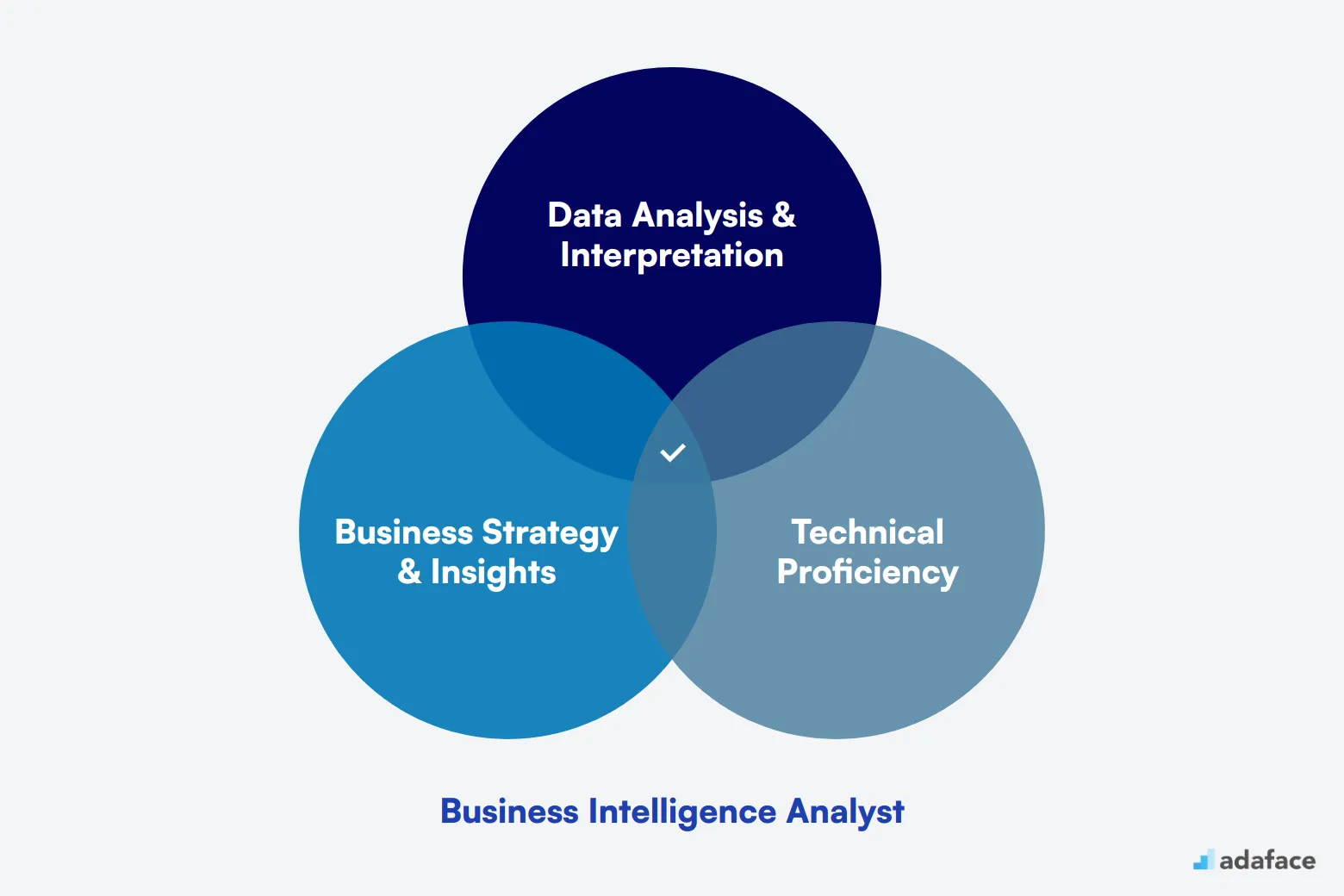
Business Intelligence Analyst Hiring Process
Hiring a Business Intelligence Analyst is a strategic step for organizations looking to leverage data for insights. The process typically takes around 1-2 months, depending on the speed of your recruitment pipeline.
- Craft a compelling job description: Start by crafting a clear and detailed job description that outlines key responsibilities and required qualifications. Post it on relevant job boards and platforms.
- Resume screening: Expect to receive resumes within the first week. Use AI tools or manual screening methods to shortlist candidates who match the job criteria.
- Skill assessment: Once candidates are shortlisted, conduct role-specific skill assessments to evaluate their analytical capabilities and knowledge of business intelligence tools. This step usually takes about a week.
- Interviews: Invite candidates who pass the skill assessments to a series of interviews. Focus on both technical knowledge and their ability to interpret and communicate data-driven insights.
- Offer stage: Select the best candidate and extend an offer. Ensure the offer aligns with industry standards and candidate expectations.
To summarize, the hiring process for a Business Intelligence Analyst involves several essential steps from crafting a detailed job description to assessing skills and conducting interviews. Each step is crucial to ensure you find the right fit for your organization. In the following sections, we'll expand on these steps with helpful tips and resources.
Skills and qualifications to look for in a Business Intelligence Analyst
Crafting the right candidate profile for a Business Intelligence Analyst can be challenging. The complexity often lies in discerning between must-have skills and those that are simply nice to have. Clarity is key; it helps to draw a distinct line between required skills and preferred ones, ensuring you attract the best-fit candidate for your company.
Typically, the role demands candidates with a strong foundation in data analysis, technical proficiency, and business strategy. They should possess a Bachelor's degree in Business, Computer Science, or a related field, along with proficiency in SQL and data visualization tools such as Tableau or Power BI. Excellent communication abilities are also crucial.
Preferred qualifications, while not mandatory, can enhance a candidate's suitability. These include a Master's degree in Business Analytics, experience with statistical programming languages like R or Python, and familiarity with big data technologies. Industry-specific knowledge is also a bonus, as it can provide valuable insights into the specific needs of your field.
| Required skills and qualifications | Preferred skills and qualifications |
|---|---|
| Bachelor's degree in Business, Computer Science, or related field | Master's degree in Business Analytics or related field |
| 3+ years experience in business intelligence or data analysis | Experience with statistical programming languages (R, Python) |
| Proficiency in SQL and data visualization tools (e.g., Tableau, Power BI) | Knowledge of machine learning and predictive modeling |
| Strong analytical and problem-solving skills | Familiarity with big data technologies (e.g., Hadoop, Spark) |
| Excellent communication and presentation abilities | Industry-specific knowledge (e.g., finance, healthcare, retail) |
How to write a Business Intelligence Analyst job description?
Once you have a candidate profile ready, the next step is to capture that information in the job description to attract the right candidates. A well-crafted job description will help set clear expectations for the role and draw in qualified professionals.
- Highlight key responsibilities and impact: Clearly state the main tasks the Business Intelligence Analyst will handle, such as data analysis, reporting, and providing insights. Explain how their contributions will influence decision-making and business outcomes, making the role's importance evident.
- Balance technical skills with soft skills: While listing necessary technical skills like proficiency in SQL, data visualization tools, or experience in data warehousing, don't forget to mention essential soft skills. Communication, analytical thinking, and teamwork are equally important to ensure candidates are well-rounded.
- Showcase your company's unique selling points: Share what makes your company and this specific role appealing. Whether it's innovative projects, a collaborative culture, or opportunities for career growth, highlighting these aspects can attract top talent in a competitive market.
Top Platforms to Hire Business Intelligence Analysts
Now that you have a job description ready, it's time to list your position on various job sites to attract the right candidates. Utilizing popular job platforms increases your chances of finding qualified Business Intelligence Analysts who can meet your organization's needs.
LinkedIn Jobs
Ideal for posting full-time positions and reaching a wide network of professionals. Allows for detailed job descriptions and easy application process.

Indeed
Suitable for posting various job types including full-time, part-time, and contract roles. Offers a large candidate pool and resume database.

Glassdoor Job Posting
Effective for full-time positions, especially when targeting candidates who research company reviews and salaries before applying.
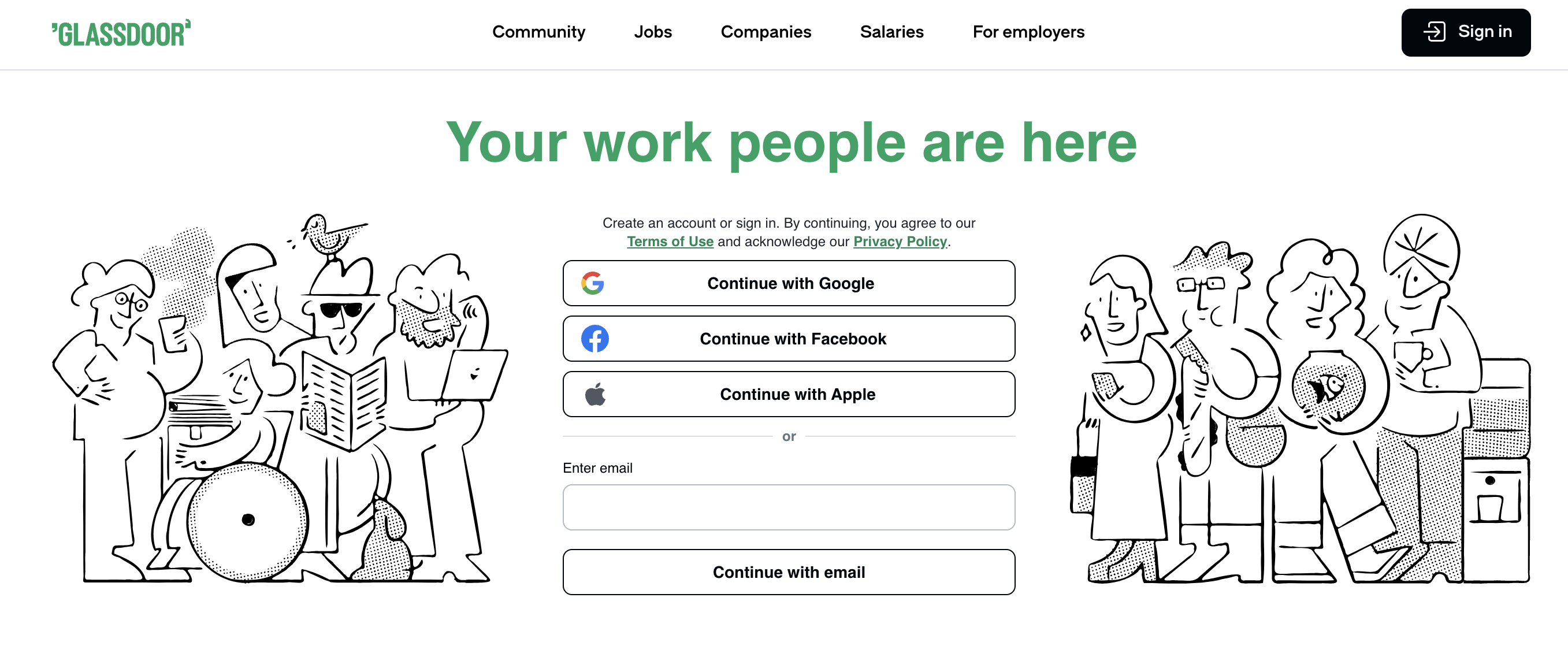
Among the top platforms, LinkedIn Jobs is perfect for full-time roles, offering a vast professional network. Indeed caters to a variety of job types, providing access to a large candidate pool. For companies focusing on employer branding, Glassdoor Job Posting is an effective choice as it allows candidates to research company reviews. The remaining platforms, including Upwork, Toptal, AngelList, Dice, FlexJobs, Robert Half, and Kaggle, also offer distinct advantages for freelance, startup, tech-focused, remote, and specialized hiring needs.
How to Screen Business Intelligence Analyst Resumes
Screening resumes is a key step to ensure you find candidates who have the right mix of skills and experience for a Business Intelligence Analyst role. Given the number of applications, it's important to focus on those that align closely with the role's requirements.
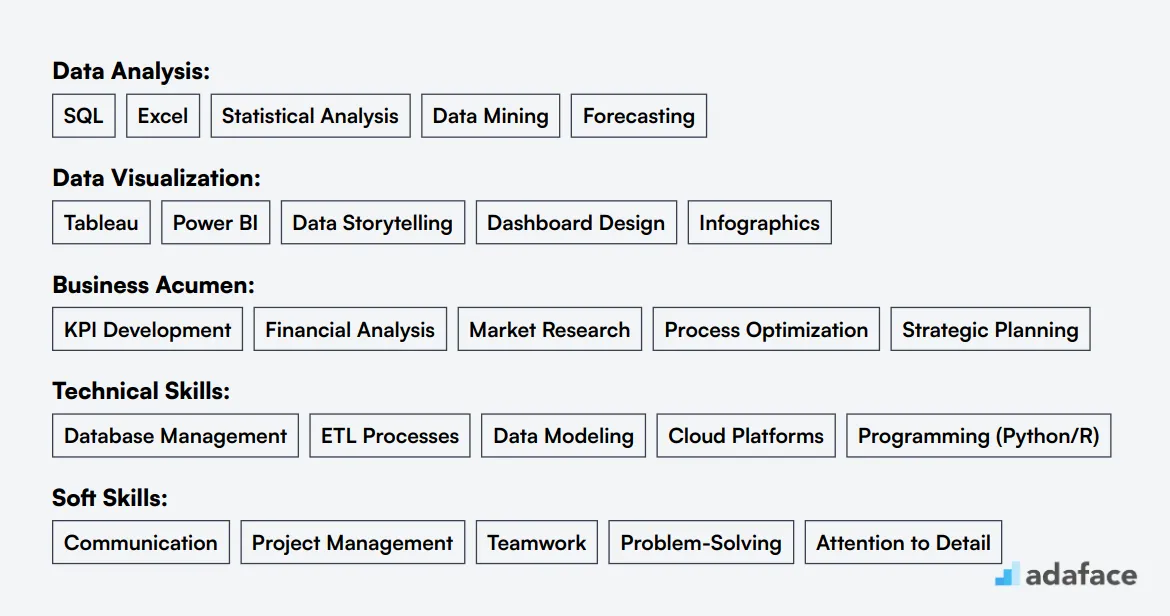
To manually screen resumes effectively, look for specific keywords that match the required and preferred skills for the role. Keywords such as "SQL", "Tableau", and "Power BI" are indicators of technical proficiency, while terms like "data analysis" and "business strategy" suggest a candidate's ability to generate insights. More detailed insights into these skills can be found in the skills required for Business Intelligence Analyst.
Alternatively, AI tools can assist in the resume screening process by identifying candidates who meet your criteria. You can use AI resume screening tools to parse through resumes, saving time and increasing accuracy by focusing on relevant keywords.
Here's a handy prompt to use with AI tools:
TASK: Screen resumes for Business Intelligence Analyst role
INPUT: Resumes
OUTPUT: For each resume, provide:
- Name
- Matching keywords
- Score (out of 10)
- Recommendation (shortlist this candidate or not)
- Shortlist (Yes, No, Maybe)
KEYWORDS DATA:
- SQL, Tableau, Power BI
- Data Analysis, Business Strategy
- Python, R, Machine Learning
Which skills tests should you use to assess Business Intelligence Analysts?
As a recruiter or hiring manager, finding the right Business Intelligence (BI) Analyst means assessing more than their resumes. Skills tests provide a straightforward way to evaluate candidates' abilities, ensuring they can transform data into actionable insights.
Business Intelligence Analyst Test: This test specifically evaluates the important skills needed by BI analysts, including data visualization and interpretation. It's designed to identify candidates who can craft strategies from complex datasets.
SQL Online Test: SQL proficiency is fundamental for any BI analyst since it's the language of databases. Assess your candidates' ability to query and manipulate data with this SQL test.
Data Analysis Test: Gauging a candidate's understanding of data analysis is crucial. This test helps determine if they can analyze patterns and trends to inform business strategies.
Power BI Online Test: Power BI is a prominent tool in the BI domain. Use this test to assess whether candidates can efficiently use Power BI to create compelling data stories.
Tableau Online Test: Tableau proficiency is a plus for BI analysts. This test evaluates candidates on their ability to use Tableau for creating interactive dashboards that support data-driven decision-making.
Structuring Technical Interviews for Business Intelligence Analysts
After candidates pass the initial skills tests, it's time for technical interviews to assess their hard skills in-depth. While skills tests are great for initial screening, technical interviews help identify the best-fit candidates for the role. Let's explore some key questions to ask during these interviews.
- Can you explain your process for data cleaning and preparation?
- How do you approach data visualization for complex datasets?
- What BI tools have you used, and which do you prefer?
- Can you describe a challenging BI project you've worked on?
- How do you ensure data accuracy and integrity in your analyses?
- What methods do you use to identify trends and patterns in data?
These questions help evaluate a candidate's practical experience, problem-solving skills, and technical knowledge in business intelligence.
Cost of Hiring a Business Intelligence Analyst
The cost of hiring a Business Intelligence Analyst varies based on location and experience. In the United States, the average annual salary ranges from $56,633 to $147,682, with a median of $91,453. Cities like Chicago and New York offer higher salaries, while smaller markets may have lower rates.
When budgeting for a BI Analyst, consider additional costs beyond salary. These may include benefits, training, software licenses, and potential relocation expenses. Factor in these elements to get a complete picture of the investment required for this role.
Business Intelligence Analyst Salary in the United States
The average salary for a Business Intelligence Analyst in the United States is $98,076 per year. Salaries typically range from $56,633 to $147,682, with the median being $91,453.
Location plays a significant role in determining salary. For example, Chicago offers the highest average at $127,035, while Indianapolis has the lowest at $60,306. Other high-paying cities include New York ($114,518) and Mountain View ($103,694).
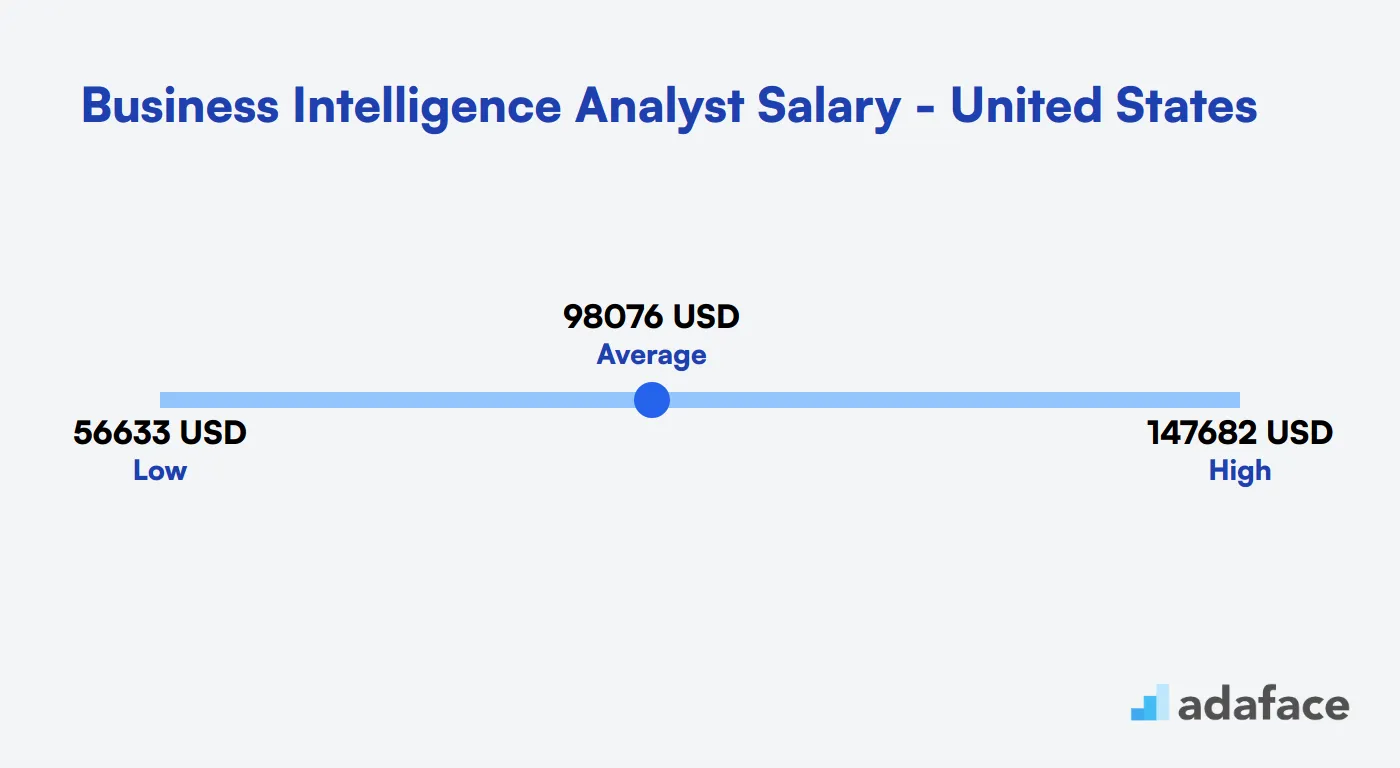
Business Intelligence Analyst Salary in Australia
In Australia, the average salary for a Business Intelligence Analyst is approximately AUD 109,992. Salaries can range from a minimum of AUD 80,692 to a maximum of AUD 142,695, depending on factors such as location and experience.
Salaries vary across different cities. For instance, in Sydney, the average is around AUD 107,167, while in Perth, it goes up to AUD 126,671.
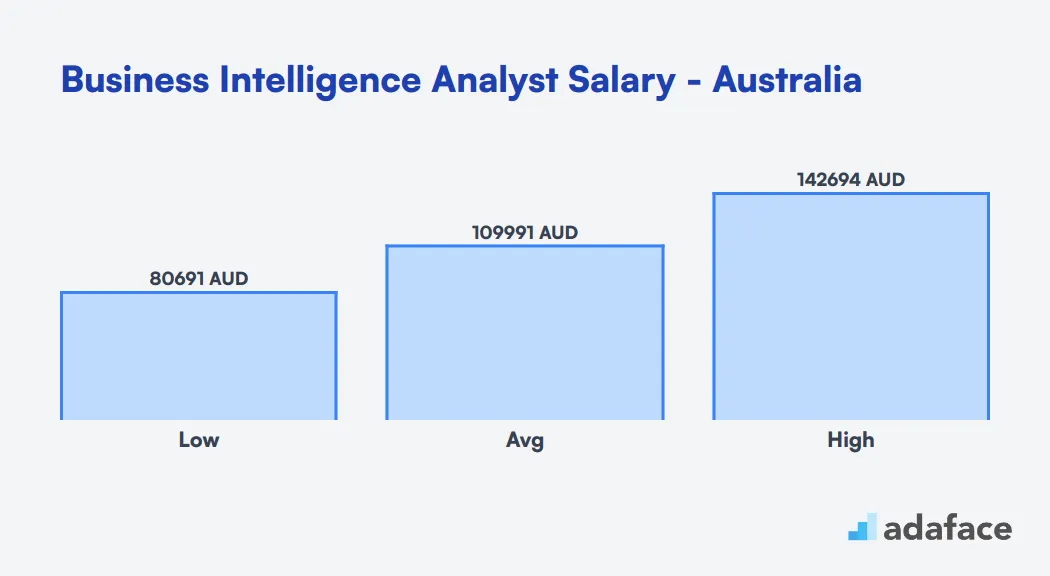
Business Intelligence Analyst Salary in Canada
In Canada, Business Intelligence Analysts earn competitive salaries. The average annual salary ranges from CAD 57,592 to CAD 117,143, with a median of CAD 82,137.
Salaries vary by location, with Montréal offering the highest median at CAD 102,730, followed by Toronto at CAD 87,913. Vancouver and Calgary offer lower medians at CAD 77,760 and CAD 71,915 respectively.
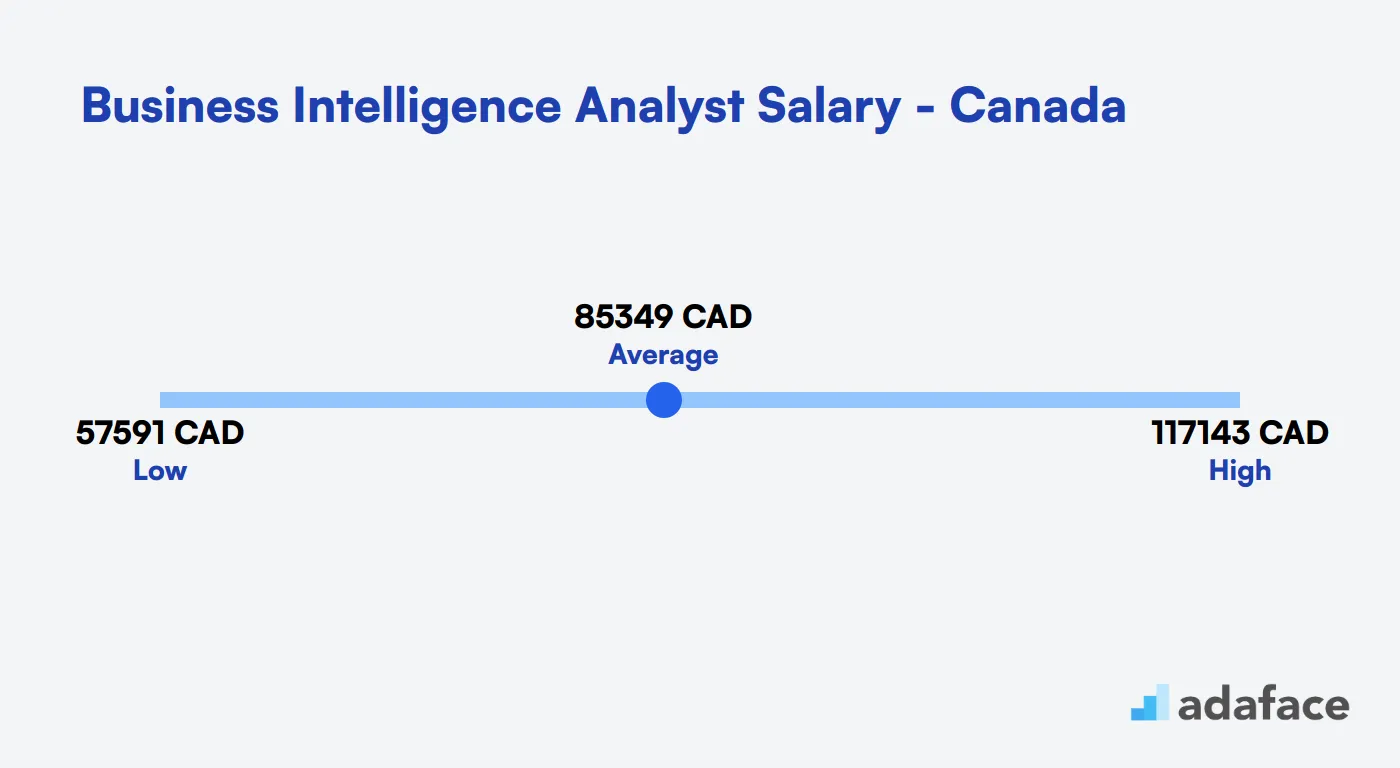
What's the difference between a Business Intelligence Analyst and a Data Analyst?
At first glance, Business Intelligence Analysts and Data Analysts might seem similar, but their roles and focuses are quite distinct. It's common to confuse them because both deal with data analysis and insights, albeit in different contexts.
A Business Intelligence Analyst turns data into actionable business insights and drives strategic decision-making. They often work with tools like Power BI and Tableau to create dashboards and strategic reports. Their focus is on generating insights that can impact the business at a strategic level, emphasizing business knowledge and communication skills.
On the other hand, Data Analysts concentrate more on data collection, cleaning, and exploration. They use tools like Excel and SQL, complemented by programming languages like Python. Their primary task is to provide reports and insights for operational purposes. The focus here is on the technical manipulation of data and statistical analysis, making it more about hands-on data handling.
Understanding the difference is important when hiring these professionals. While both roles are vital for a data-driven organization, the choice depends on whether you need strategic insights or operational report generation.
| Business Intelligence Analyst | Data Analyst | |
|---|---|---|
| Focus Area | Business Insights and Strategy | Data Exploration and Report Generation |
| Key Tools | Power BI, Tableau, SQL | Excel, SQL, Python |
| Main Tasks | Transform data into business insights | Data collection and cleaning |
| Business Impact | Strategic decision support | Operational reporting |
| Skill Emphasis | Business knowledge and communication | Data manipulation and statistics |
| Typical Deliverables | Dashboards, Strategic Reports | Data Sets, Ad-hoc Reports |
| Industry Knowledge | High | Moderate |
| Technical Expertise | Moderate | High |
What are the ranks of Business Intelligence Analysts?
The role of a Business Intelligence Analyst can often be confused with other data-related positions. Understanding the different ranks within this field can help clarify the specific responsibilities and expertise required for each level.
• Junior Business Intelligence Analyst: This is an entry-level position where analysts support the team by gathering data and assisting with report generation. They typically have a basic understanding of data analysis tools and techniques.
• Business Intelligence Analyst: At this level, analysts take on more responsibility, including data modeling, reporting, and providing insights to stakeholders. They are expected to have a solid grasp of BI tools and the ability to analyze complex datasets.
• Senior Business Intelligence Analyst: Senior analysts lead BI projects and mentor junior team members. They focus on strategic analysis and are involved in decision-making processes, often working directly with management.
• Business Intelligence Manager: This role entails overseeing the BI team and ensuring that the organization's data strategy aligns with business goals. Managers are responsible for resource allocation and project management.
• Director of Business Intelligence: As a senior leadership role, the director sets the vision for data analytics within the organization. They typically report to the executive team and play a key role in shaping the company's overall data strategy.
Hire the Best Business Intelligence Analysts
Throughout this guide, we've covered the key aspects of hiring Business Intelligence Analysts. From understanding their role to crafting job descriptions, screening resumes, and conducting interviews, each step is important in finding the right candidate for your team.
The most important takeaway is to use a mix of well-crafted job descriptions and skills tests to make your hiring process more accurate. By assessing candidates' technical skills and problem-solving abilities, you can ensure you're bringing on board a BI Analyst who can truly drive your data-driven decision-making process.
Business Intelligence Analyst Test
FAQs
Key skills for a Business Intelligence Analyst include proficiency in SQL, data visualization tools (like Tableau or Power BI), statistical analysis, and strong problem-solving abilities. They should also have excellent communication skills and business acumen. You can find a detailed list in our skills required for Business Intelligence Analysts guide.
An effective job description should clearly outline the role's responsibilities, required technical skills, and desired soft skills. It should also highlight the impact of the role on the organization. For a template and tips, check out our Business Intelligence Analyst job description guide.
Using a combination of technical interviews and skills assessment tests is the most effective way to evaluate a candidate's abilities. Our Business Intelligence Analyst Test can help you objectively assess candidates' technical proficiency.
Technical interviews should include questions about data analysis techniques, SQL queries, and data visualization. Also, present real-world scenarios to assess problem-solving skills. For specific questions, refer to our Business Intelligence Analyst interview questions guide.
While there's some overlap, Business Intelligence Analysts typically focus more on creating reports and dashboards for business users, while Data Analysts often perform more in-depth statistical analysis. BI Analysts also tend to have a stronger focus on business strategy and communicating insights to non-technical stakeholders.
LinkedIn, professional data science communities, and specialized job boards are good starting points. Additionally, consider reaching out to universities with strong data science programs for recent graduates. Employee referrals can also be a valuable source of qualified candidates.
While industry experience can be beneficial, it's not always necessary. Focus on candidates with strong analytical skills, adaptability, and the ability to quickly understand business contexts. A candidate from a different industry might bring fresh perspectives to your data analysis processes.

40 min skill tests.
No trick questions.
Accurate shortlisting.
We make it easy for you to find the best candidates in your pipeline with a 40 min skills test.
Try for freeRelated posts
Free resources



